-
2020-05-21
-
2020-05-21
-
2020-05-21
-
2020-05-21
-
2020-05-21
更新时间:2020-05-21浏览:次评论: 条
2020-05-21
2020-05-21
2020-05-21
2020-05-21
2020-05-21
外研版高中必修一unit6重点单词、短语、句型、电子书、英语网课、难点考点

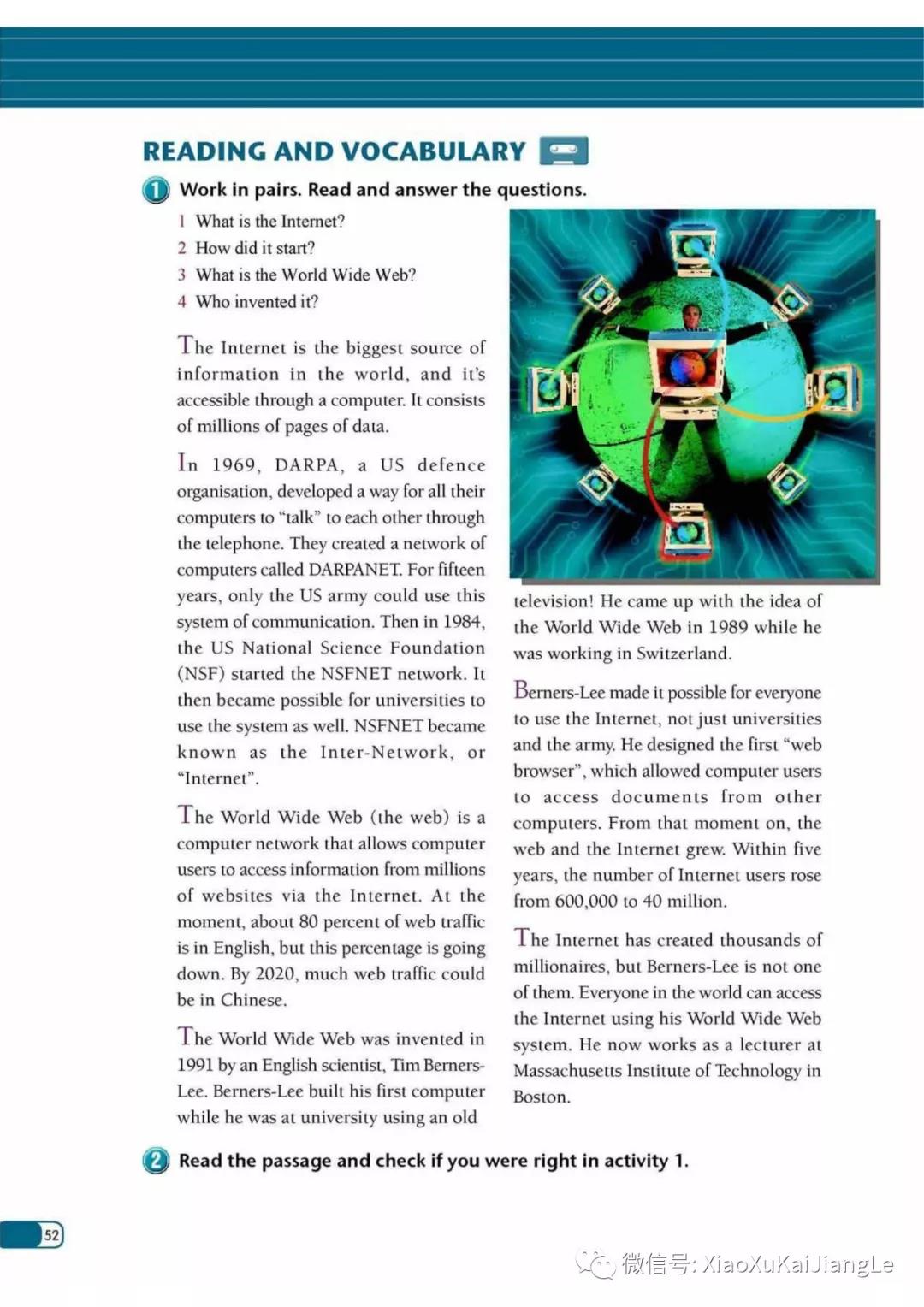
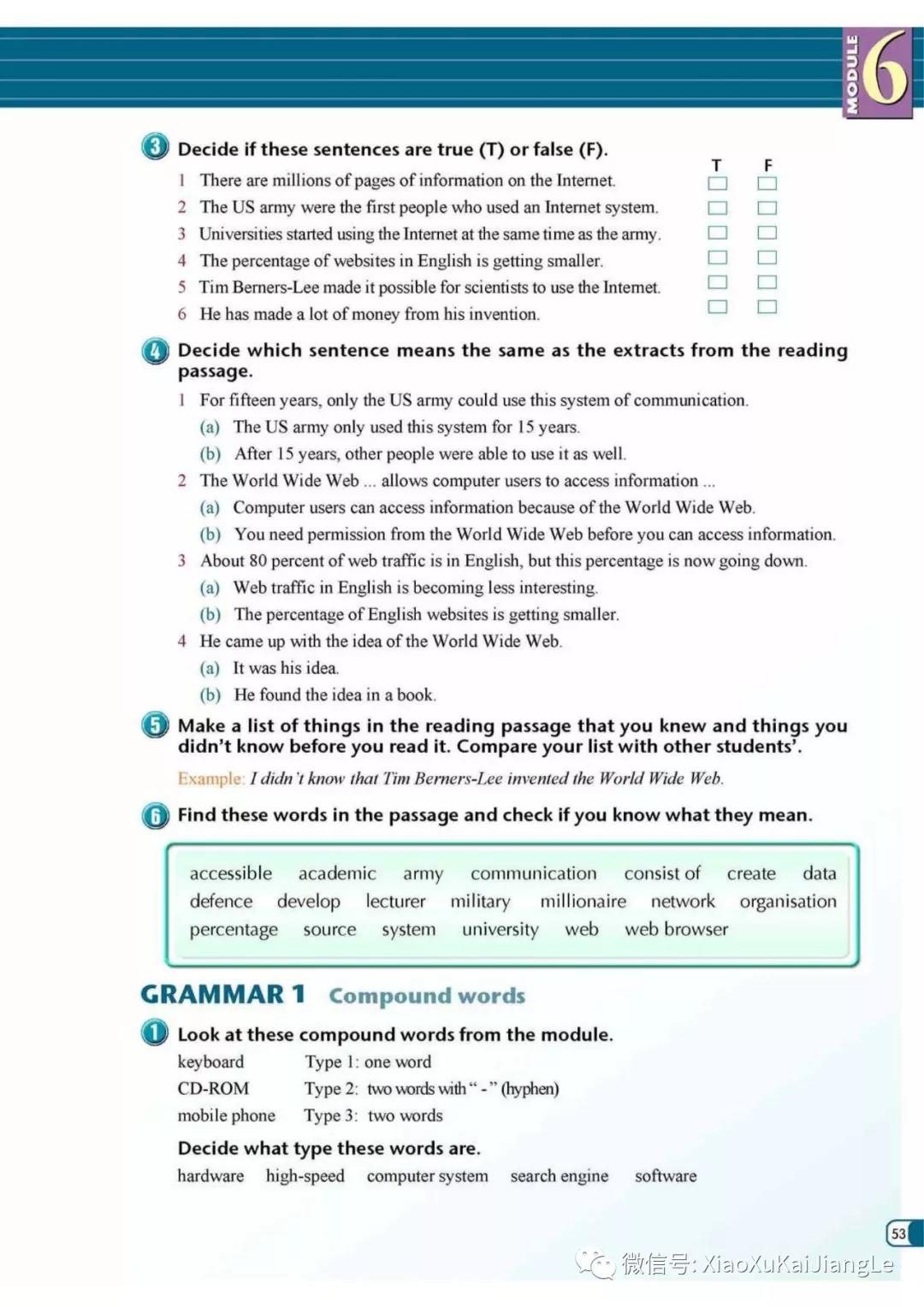
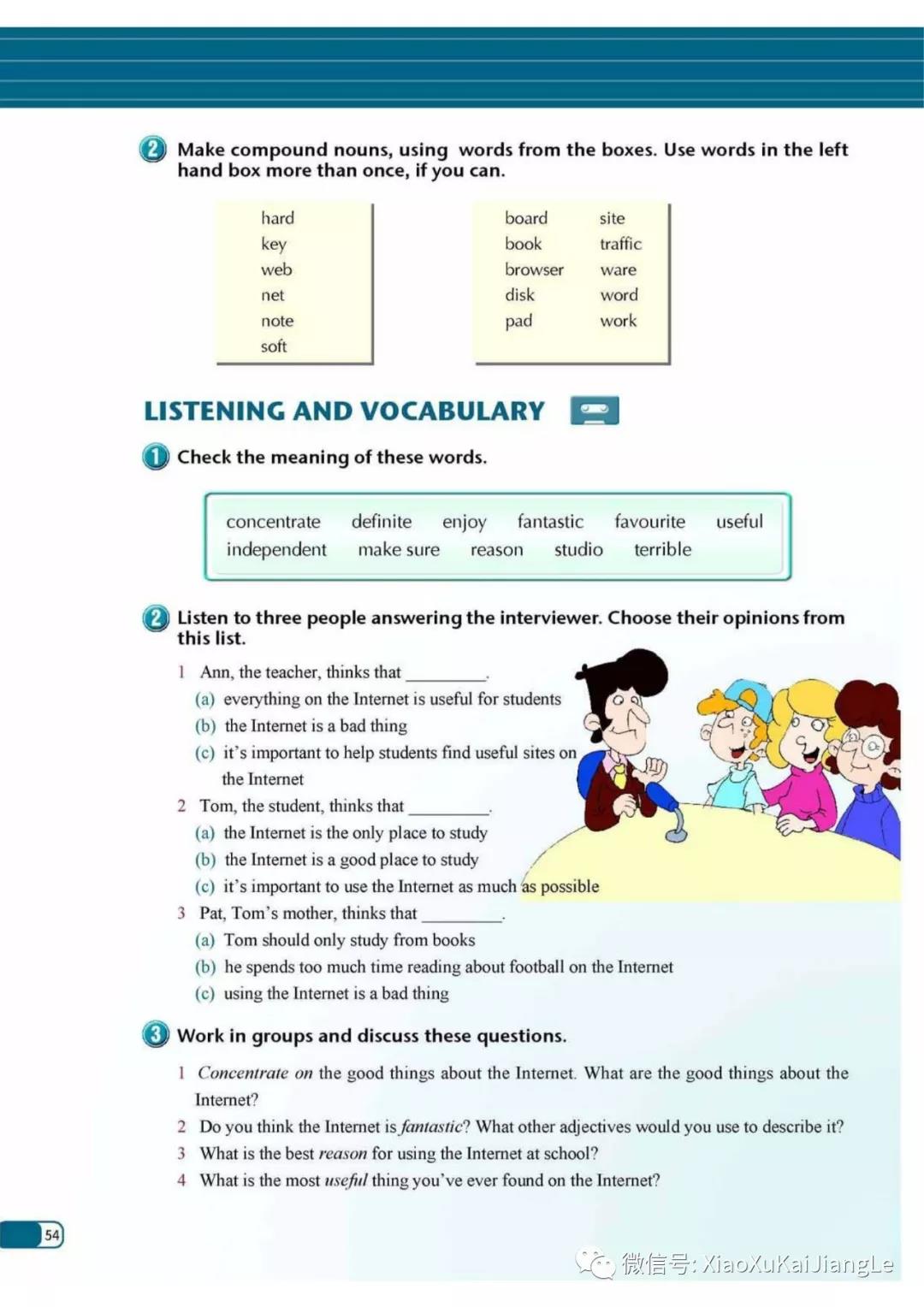
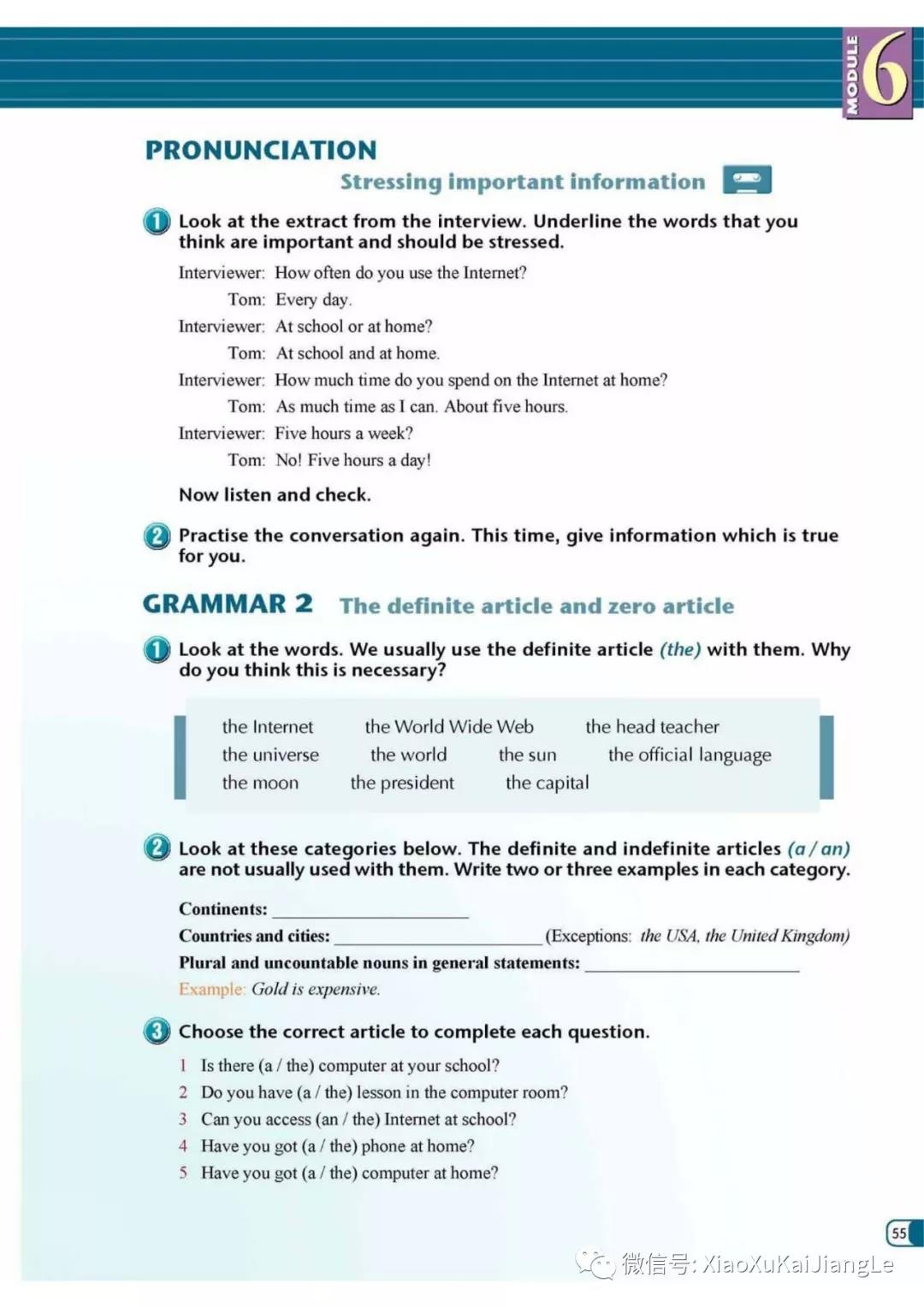

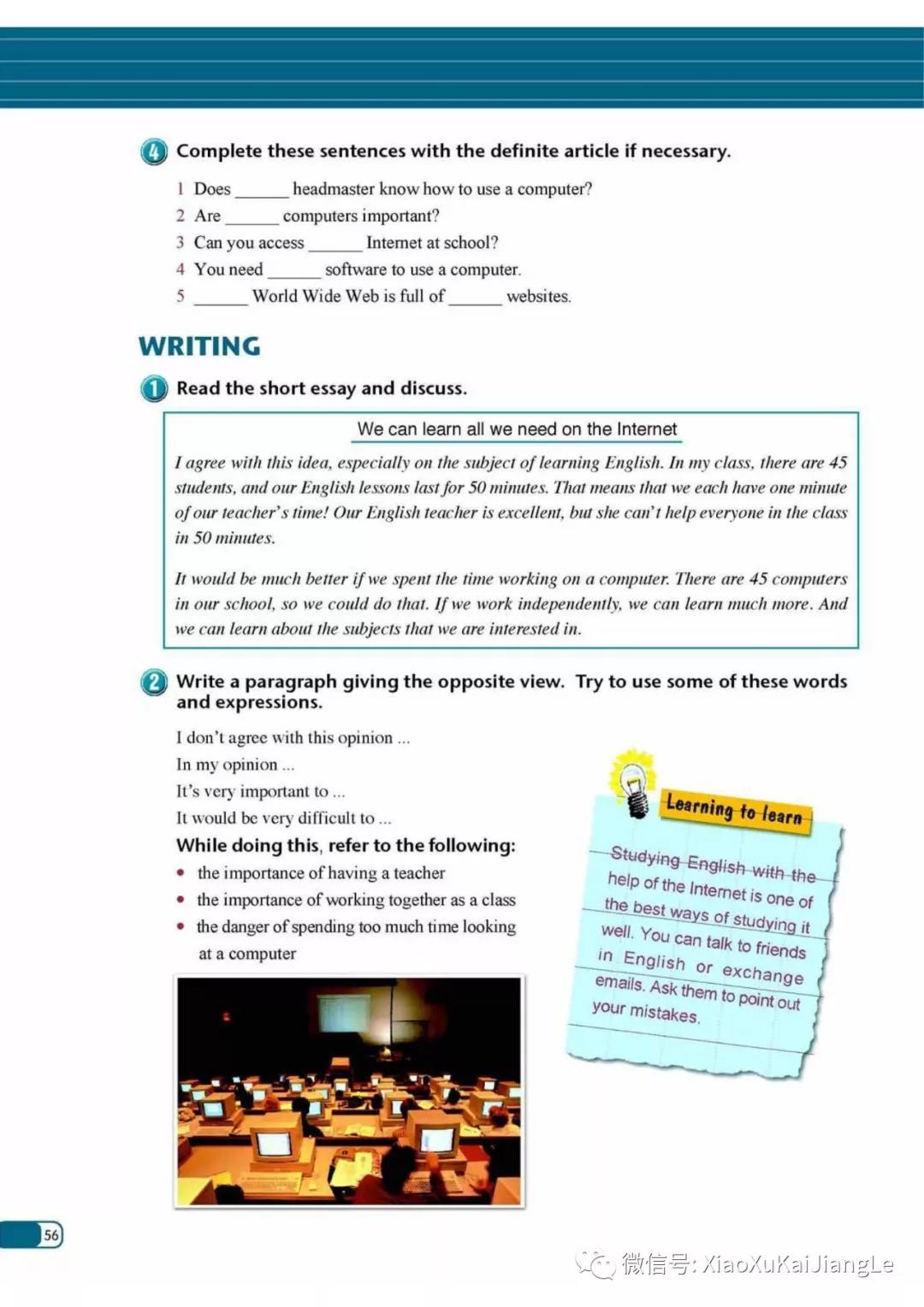
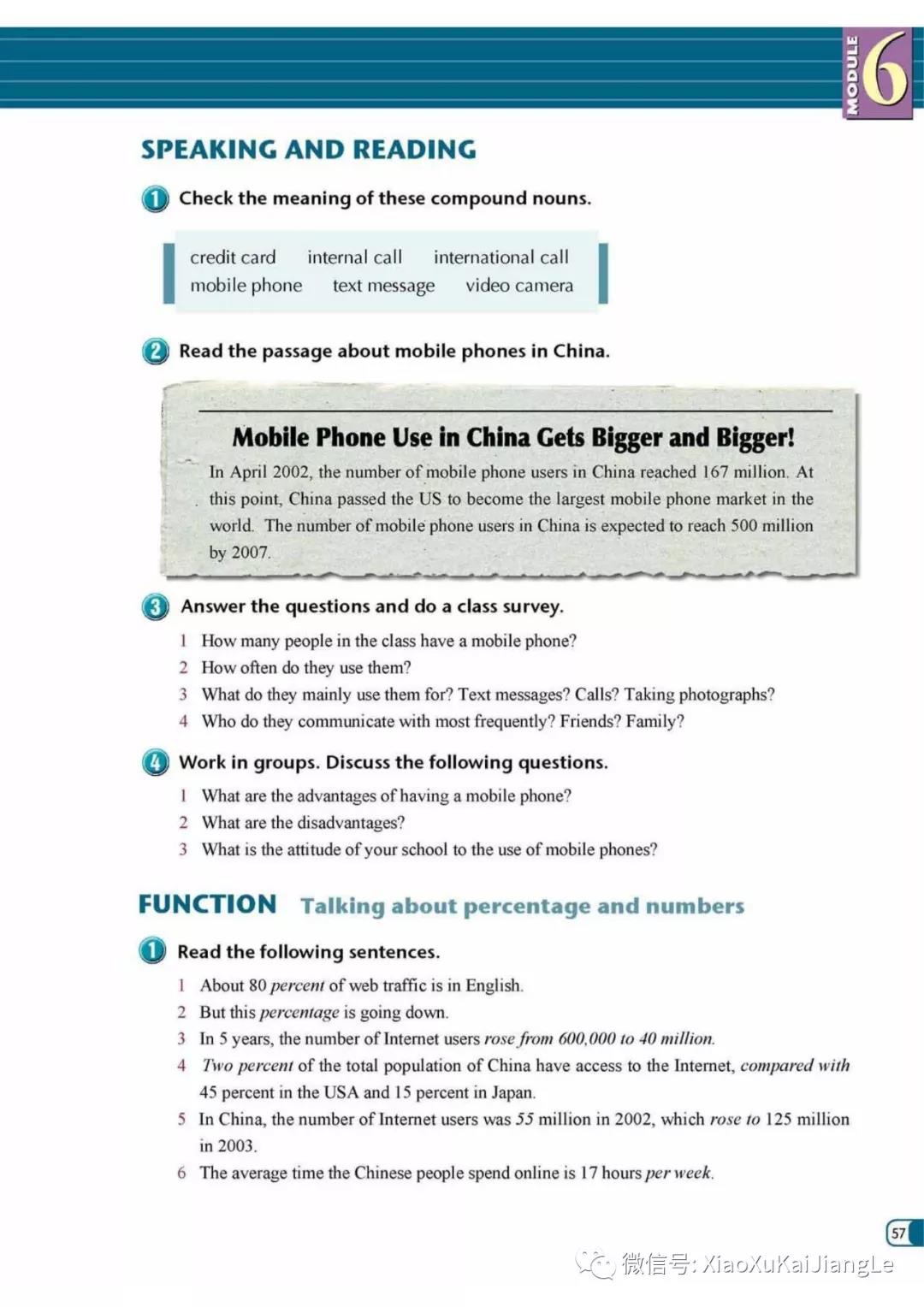
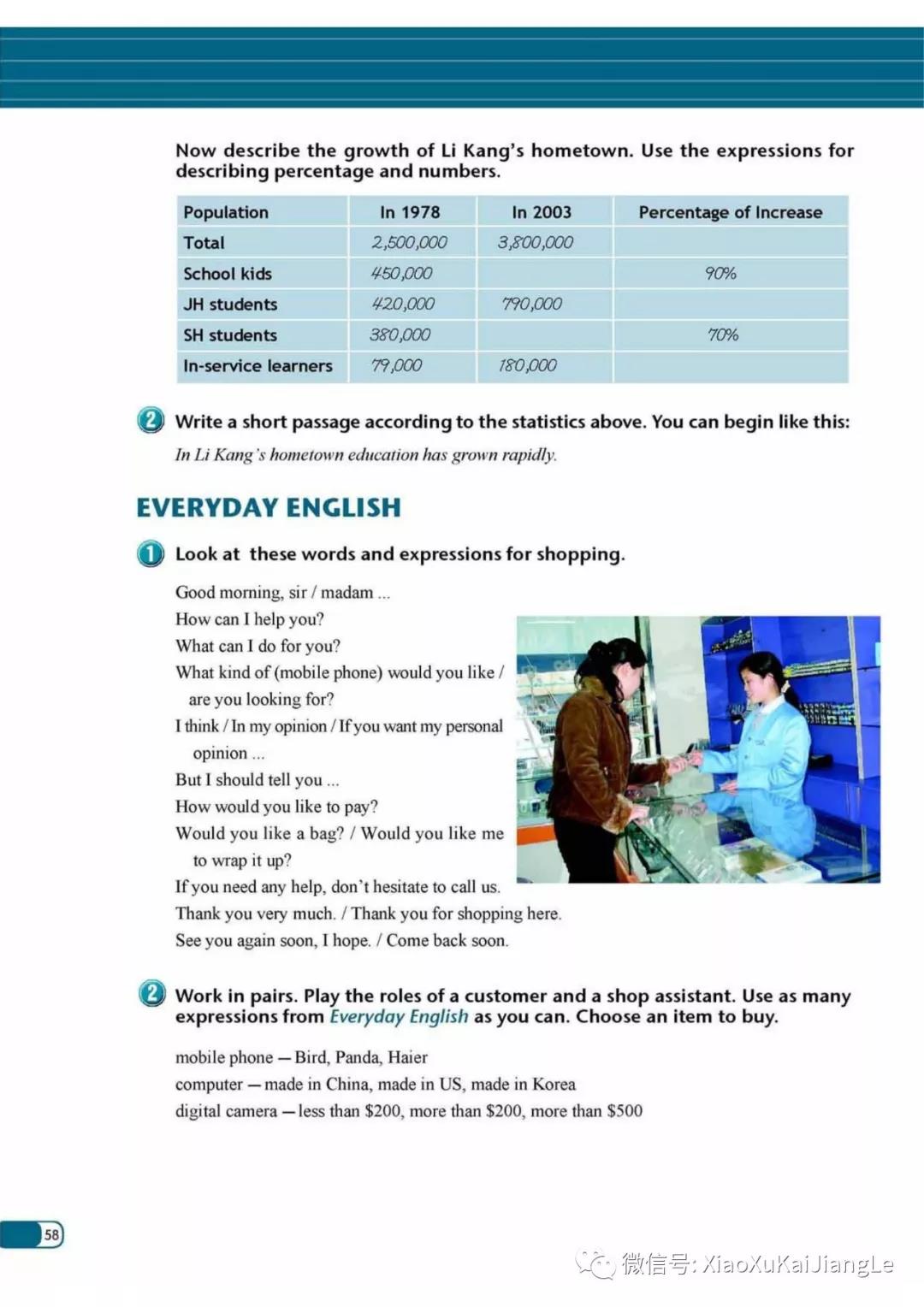
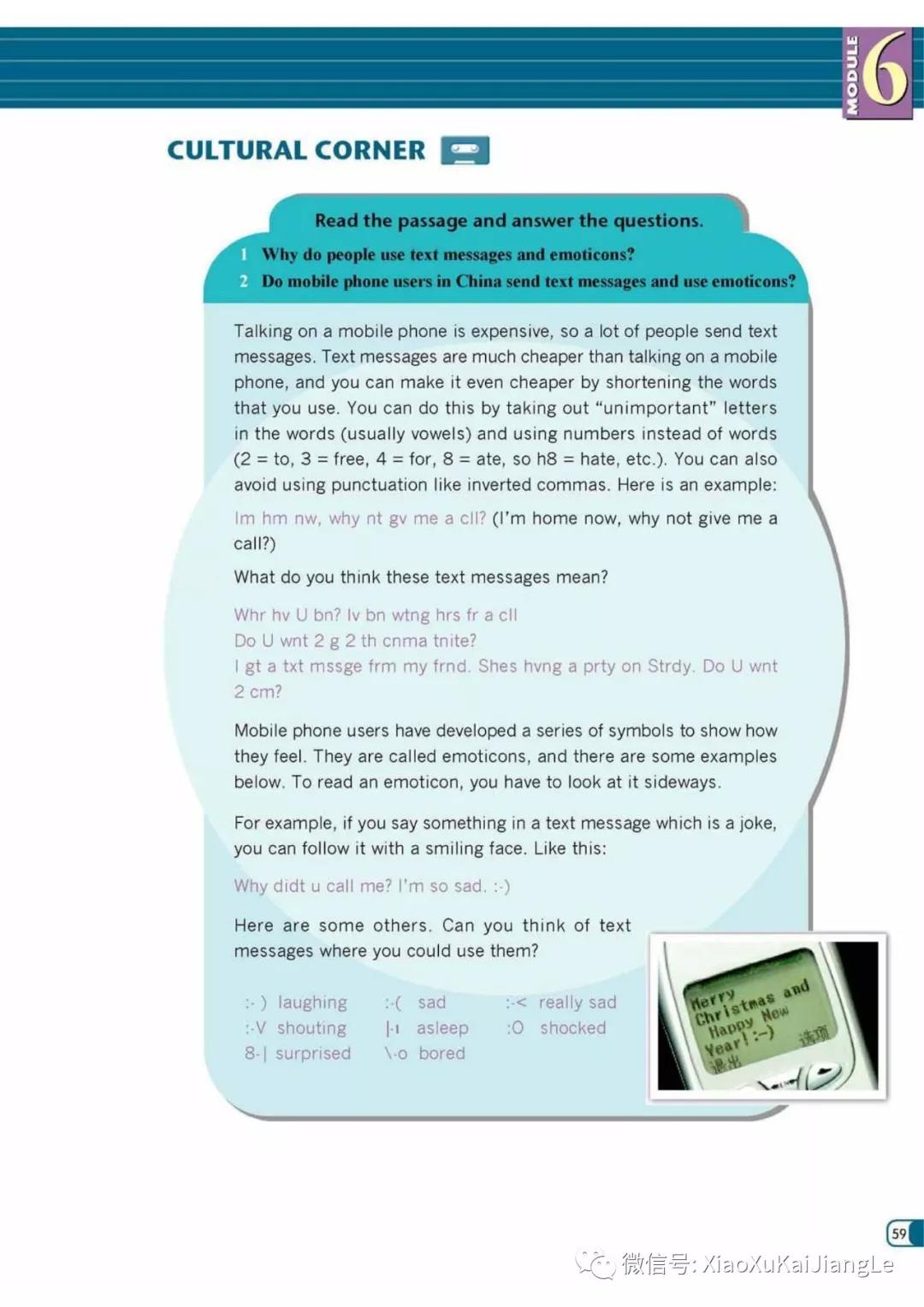
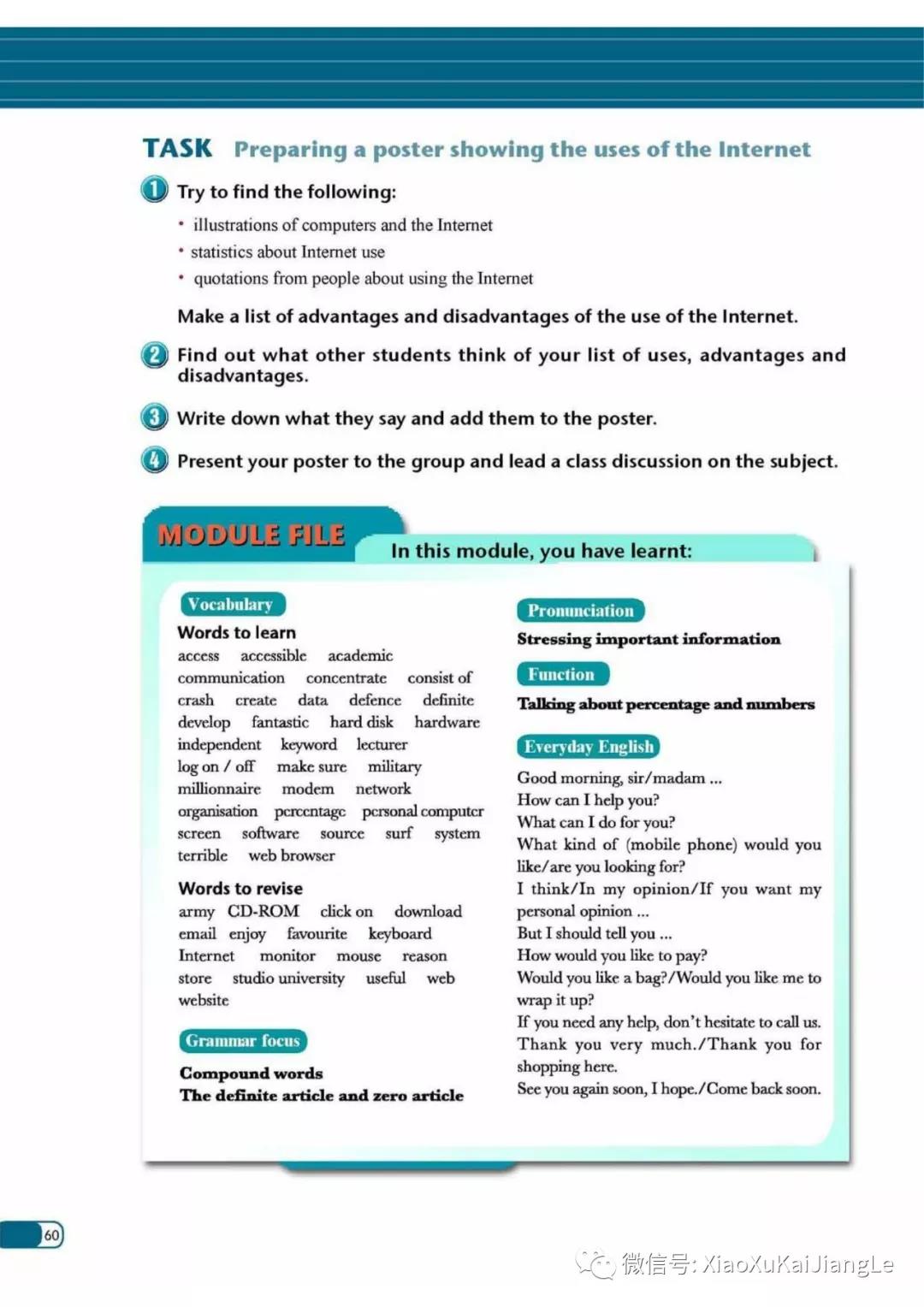
同步微课音频视频扫码体验

Module 6
单词
contain [kən'tein] vt. 包含;包括
access ['ækses] n.接近;通路
crash [kræʃ] vi.(计算机)崩溃
keyword ['ki:wə:d] n.密码;口令
log [lɒg] vt.记录;登录
software ['sɒftwєə] n. 软件
breakdown ['breikdaun] n.故障
source [sɒ:s] n.来源;出处
accessible [ək'sesəbl] adj.可进入的;可使用的
data ['deitə] n.(复)数据
defence [di'fens] n.保护;防卫
create [kri:'eit] vt. 创造;发明
network ['netwə:k] n. 网络
via [vaiə] prep.途径;经由
percentage [pə'sentidʒ] n.百分数;百分率
design [di'zain] vt. 设计
document ['dɒkjumənt] n. 文件
invention [in'venʃən] n. 发明
permission [pə'miʃən] n. 许可
military ['militəri] adj.军事的;军队的
concentrate ['kɒnsəntreit] vi.集中(注意力、思想等)
definite ['definit] adj. 明确的
fantastic [fæn'tæstik] adj.极好的;美妙的
independent [ˌindi'pendənt] adj.独立的
essay ['esei] n.文章
pass [pæs] vt. 超过
frequently ['fri:kwəntli] adv.时常;经常
disadvantage [ˌdisəd'vɑ:ntidʒ] n.弊端;缺点
average ['ævəridʒ] adj.平均的
statistics [stə'tistiks] n.(复)统计数字
shorten ['ʃɒ:tn] vt.缩短
sideways ['saidweiz] adv.横着地;斜着地
短语
consist of 由……组成
as well 也
become known as 作为……而出名;被称为……
go down 下降
come up with 提出
from that moment on 从那时起
concentrate on 聚精会神;集中思想
compared with 与……相比
on the Internet 在因特网上
computer hardware 电脑硬件
the biggest source of information最大的信息来源
be accessible through a computer通过电脑可接入的
millions of pages of data成万上亿页的数据
three thousand books三千本书
two hundred of us我们中的200人
develop a way to do ... 开发一种做……的方法
via the Internet通过因特网
at the moment 此时此刻
at university 在大学里
rise from A to B 从A上升到B
thousands of millionaires 成千上万的百万富翁
work as… 以……身份工作
the percentage of… ……的百分比
concentrate on… 集中精神在……
as much time as I can 尽可能多的时间
agree with/to/on 同意
work independently 独立工作
in one’s opinion 在某人看来
be expected to do... 被希望/盼望做……
take full advantage of充分利用
have access to… 有进入……的机会
wrap…up 打包……
don’t hesitate to do... 毫不犹豫做……
talking on a mobile phone 通过手机讲话
with the help of... 在……的帮助下
point out one’s mistakes 指出某人的错误
a series of一系列的
句型
1.Everyone present was given a gift, including me/me included.
在场的每个人都得到了一件礼物,包括我在内。
2.Medicine should not be kept where it is accessible to children.
药品不应放在儿童容易拿到的地方。
3.The only access to the farmhouse is across the fields.
到达农舍的惟一通路是穿过田野。
4.These exercises are designed to build up our body, so we all like to do.
这些锻炼是为了强身健体,因此我们都喜欢做。
5.Whether this happened by design or not we shall never know.
我们将永远无法得知这事是不是有意安排的。
6.We must concentrate our efforts on improving education.
我们必须致力于改进教育工作。
7.Absorbed in the book, he didn’t notice me enter the room.
埋头于读书,他没注意到我走进房间。
8.A medical team consists of/is made up of/ is composed of 15 doctors and 13 nurses.
十五名医生和十三名护士组成了一个医疗队。
9.Actions should consist with one’s words.
言行应该一致。
10.His children as well as his wife were invited to the party.
不但他太太,连他的孩子都被邀请参加了那次晚会。
11.How did it come about that you were late for half an hour in such a short trip?
这么短的路程你迟到半小时,怎么回事?
12.When it comes to educating children, the Chinese parents think little of money.
当谈到教育孩子的问题时,中国的父母亲不大考虑金钱。
13.Had she lived up to her promise, she would have made it to Yale University.
如果她实现了她的诺言,她就能成功地去上耶鲁大学了。
14.The bad weather made it impossible for us to go on.
糟糕的天气使我们无法进行下去。
15.We thought it wrong that the child should be left alone in the house.
我们认为把孩子独自一个人留在家里是不对的。
16.He didn’t make it clear when and where the meeting would be held.
何时何地举行会议他没表达清楚。
语法
Ⅰ.合成词
由两个或两个以上独立的词合成的新词叫合成词。合成词有的用连字符"-"连在一起,有的直接连在一起。常见的合成词有合成名词、合成形容词、合成动词等。
1.合成名词
(1)合成名词可在句中作主语、宾语等。
▶ Sightseeing took up the whole morning. 观光花了一上午时间。
▶ Smoking is not allowed during take-off. 飞机起飞时不允许吸烟。
(2)合成名词的常见构成方式:
● 名词+名词
▶ football 足球 self-respect 自尊
● 动词+副词
▶ breakout 越狱 take-off 起飞
● 副词+动词
▶ outbreak 崩溃 income 收入
● -ing+名词
▶ sleeping-pill 安眠药 dining-car 餐车
● 形容词+名词
▶ blackboard 黑板 double-dealer 两面派
2.合成形容词
(1)合成形容词多在句中作定语,有些也可作表语。
▶ He can speak a lot of everyday English. 他会说很多日常英语。
▶ She is very outgoing. 她很外向。
(2)合成形容词的常见构成方式:
● 数词+名词(+形容词)
▶ eight-year-old 八岁的 three-metre(-long)三米(长)的
● 形容词/副词+现在分词
▶ hard-working 勤劳的 easy-going 随和的
● 名词+现在分词
▶ mouth-watering 令人垂涎的 peace-loving 热爱和平的
● 形容词/副词+过去分词
▶ ready-made 现成的 well-known 著名的
● 名词+介词+名词
▶ face-to-face 面对面的 shoulder-to-shoulder 肩并肩的
● 名词+过去分词
▶ man-made 人造的 self-educated 自学的
● 数词/形容词+名词-ed形式
▶ four-legged 四条腿的 warm-hearted 热心肠的
● 形容词+名词
▶ high-class 高级的 large-scale 大规模的
● 名词+形容词
▶ snow-white 雪白的 colour-blind 色盲的
3.合成动词
合成动词的常见构成方式:
● 名词+动词
▶ sleepwalk 梦游 sightsee 观光
副词/介词+动词
▶ overthrow推翻 undergo经历
● 形容词+动词
▶ whitewash 粉刷 safeguard 捍卫
● 副词/介词+名词
▶ underline 在……下画线 overpower 制胜,压倒
Ⅱ.冠词
考点一:不定冠词的用法
1.不定冠词的基本用法
(1)表示数量"一"的概念,与one相近,但不如one语气强。
▶ I have a bike. It's made in Shanghai. 我有一辆自行车,它产于上海。
(2)用在可数名词单数前,泛指一类人或事物。
▶ A bird has wings. 鸟有翅膀。
▶ A teacher shouldn't talk like that. 教师不应当那样讲话。
(3)用来表示不确定的某一个,相当于a certain, some。
▶ A Mr Wang came to see you this morning. 今天早上一位王先生来找过你。
(4)表示"每一",相当于per或each。
▶ The car can run 200 kilometres an hour. 这种车每小时能行驶200公里。
(5)用于首次提到的对话一方不知道的人或物前。
▶ There is a park on the corner of the street. 在这条街的拐角处有个公园。
(6)用在物质名词前,表示"一阵、一份、一场、一种"等。
▶ They were caught in a heavy rain. 他们遇上了一场大雨。
▶ I'd like to have an ice cream. 我想来一份冰激凌。
(7)knowledge, collection, understanding等名词后加of...时,其前或其修饰语前常用不定冠词a/an。
▶ Her new book is a collection of short stories. 她的新书是一部短篇小说集。
▶ He has a good knowledge of French. 他精通法语。
(8)具有动作意义的名词在与have,take,make,give等动词构成短语表示一种短暂性的动作时,此名词前须用不定冠词。
▶ have a look/walk/break/try 看一看/散步/休息/试一试
(9)用在某些固定搭配中。
▶ as a result 因此 as a rule 通常
▶ as a whole 总体上 as a matter of fact 事实上
▶ at a loss 不知所措 in a hurry 匆忙
▶ in a word 总之 in a sense 在某种意义上
2.不定冠词的特殊用法
(1)不定冠词可以用于某些具体化的抽象名词前,可以具体化的抽象名词有shame, surprise, pleasure, honour, success, help, beauty, failure等。
▶ It's a pleasure for me to work with you. 和你一起工作我非常高兴。
▶ She was a famous beauty in her youth. 她年轻时是个有名的美人。
(2)表示世界上独一无二的事物的名词前一般加定冠词the,但如果名词前有修饰语,可用不定冠词。如:
▶ the world, a peaceful world; the moon, a bright moon
(3)不定冠词用于序数词前表示"又一,再一",相当于another。
▶ Can you give me a second chance, please? 你能再给我一次机会吗?
(4)表示一日三餐的名词和专有名词前如果有形容词修饰,也可用不定冠词。
▶ I had a wonderful supper yesterday. 昨晚我吃了一顿美味佳肴。
(5)"a most+形容词"表示"很……",most在此不表示最高级含义,而是"很,非常"的意思,相当于very; "the+most+多音节形容词"为多音节形容词的最高级形式,表示
"最……"。
▶ This is a most interesting film. 这是一部非常有趣的电影。
(6)用在"be+of+a(n)+n."结构中,表示"相同的",相当于the same。
▶ They are nearly of an age. 他们几乎同岁。
(7)不定冠词的使用与数的概念有关,如果两个名词共有一个不定冠词,那么这两个名词指同一个人或物。
▶ His father is a teacher and poet. 他父亲是位教师兼诗人。
(8)不定冠词用在专有名词中的地名前,表示"一个……的地方"。
▶ She is now a different China from what she was twenty years ago. 现在的中国是一个与二十年前不同的国家了。
考点二:定冠词的用法
1.定冠词的基本用法
(1)表示"特指"。上文已经提到的人或物,再次提到时在其前加the;也可指上文未提到,但谈话双方都知道的人或物。
▶ He bought a house. I've been to the house. 他买了幢房子。我去过那幢房子。
(2)用在可数名词单数前表示一类人或事物。
▶ The rose is my favourite flower. 玫瑰花是我最喜爱的花。
(3)用在被短语或从句修饰的名词前表示特指。
▶ The young man is the student who I taught 10 years ago. 这个年轻人是我十年前教过的学生。
(4)指世界上独一无二的事物。但当这些名词前有修饰成分时,可以用不定冠词。
The earth goes around the sun. 地球围绕太阳转。
(5)用在序数词、形容词/副词最高级以及形容词only,very,same等前面。
▶ Is this the first time you have visited Beijing? 这是你第一次游览北京吗?
▶ He runs the fastest in his class. 他是他们班跑得最快的。
(6)用在表示姓氏的复数名词之前,表示一家人或夫妻俩。
▶ The Greens are on holiday now. 格林一家(夫妇)现在正在度假。
(7)用于表示具体的地点、方位、时间或某天的一部分等的名词前。如:
▶ in the east/south/west/north在东/南/西/北方
▶ on the right/left在右/左边
(8)用在表示江河、湖泊、海洋、山脉、岛屿、海湾、海峡、报纸、书籍、杂志、会议、条约等的专有名词前。
▶ the Pacific (Ocean)太平洋 the Persian Gulf 波斯湾
▶ the Himalayas 喜马拉雅山脉
(9)用在某些固定词组中。
▶ make the most/best of 充分利用
▶ in the end 最后
▶ by the way 顺便说一下
▶in the distance 在远处
2.定冠词的特殊用法
(1)用于表示世纪、年代、朝代的名词以及逢十的复数名词前(指某个年代)。如:
▶ in the 1990's 在20世纪90年代;the Qing Dynasty 清朝
(2)在 "动词(take/catch/pat/hit/...)+sb.+介词(by/in/on)+the+名词(身体某一部位)"结构中,名词前要用定冠词the,而不用物主代词。
▶ He took her by the hand. 他拉住了她的手。
(3)用在表示度量单位的名词,如by the hour/day/week/month/year/dozen/yard/ton/kilo,但是size/weight/time这类名词跟by连用时不加冠词。
▶ I hired the car by the hour. 我按小时租了这辆车。
(4)用于句型 "the+比较级...,the+比较级... ",该句型表示"越……越……"。
▶ The more we get together, the happier we'll be. 我们相处的时间越多,就越幸福。
(5)用于某些形容词或分词前面表示一类人或事物。作主语时谓语动词一般用复数,但在表示某一个人或某种抽象概念时谓语动词用单数。
▶ The rich should help the poor. 富人应当救助穷人。
▶ The learned are very modest. 有学问的人很谦逊。
考点三:零冠词的用法
1.零冠词的基本用法
(1)(第一次使用的)不可数名词前通常不用冠词。如:
▶ Man needs air and water. 人类需要空气和水。
(2)专有名词前一般不用冠词。但某些由普通名词构成的专有名词前通常用定冠词。如:
▶ Lei Feng 雷锋 Beijing 北京 the United States 美国
(3)复数名词泛指一类人或事物时,其前不用冠词。
▶ On weekends, shopping malls are always crowded with people. 周末,商场里总是挤满了人。
(4)表示街道、广场、公园和大学等的名词前,一般不用冠词。如:
▶ Chang'an Street 长安街 Tiananmen Square 天安门广场 Beihai Park 北海公园 Tsinghua University 清华大学
(5)表示学科名称、球类运动、棋类游戏等的名词前不用冠词。
▶ I am very interested in English. 我对英语很感兴趣。
(6)表示一日三餐等的名词前一般不用冠词。但若指具体的某顿饭或三餐前有形容词修饰时要用冠词。如:
▶ have breakfast/lunch/supper 吃早饭/午饭/晚饭
▶ have a wonderful supper 吃一顿丰盛的晚餐
(7)表示季节、月份、星期、节假日等的名词前往往不用冠词。
▶ We like to go swimming in summer. 我们夏季喜欢去游泳。
(8)名词前已有指示代词、物主代词或不定代词时不用冠词。
▶ My pen is much more expensive than yours. 我的钢笔比你的昂贵多了。
(9)表示独一无二的职位、头衔的名词前用零冠词。
▶ Mandela, president of South Africa, was awarded the Nobel Peace Prize in 1997. 南非总统曼德拉于1997年被授予诺贝尔和平奖。
2.零冠词的特殊用法
(1)turn (变成) 后的单数名词作表语其前不用冠词。
▶ His brother has turned writer. 他弟弟已成为一名作家。
(2)在"表示类型的名词+of... "这一结构中of后的可数名词单数前不用冠词。
▶ These kinds of questions often appear in the exam. 此类问题在考试中经常出现。
(3)"零冠词+可数名词单数+as/though+主语+谓语+主句"意为"尽管/虽然……但是……"。
▶ Hero as he is, he has some shortcomings. 尽管他是个英雄,他也有一些缺点。
(4)与by 连用的表示交通工具和通讯工具的名词之前不用冠词。
▶ It's quicker by air than by sea. 乘飞机比乘船快。
(5)有些名词前加定冠词和不用冠词意思差别很大:
▶ at school 在上学
at the school 在学校里
▶ at table 在吃饭
at the table 在桌子旁
▶ in hospital 住院
in the hospital 在医院里
▶ in prison 在坐牢
in the prison 在监狱里
▶ by sea 乘船
by the sea 在海滨
▶ in front of 在……的前面
in the front of 在……(内部)的前面
▶ on earth 究竟
on the earth 在地球上
▶ out of question 毫无疑问
out of the question 不可能
奇速英语全国热线:400-1000-028
欢迎关注微信公众号:奇速优课
工号:QS0043
注:图文源于网络,如有侵权请联系我们删除!
英语学习方法一窍不通? 英语学习总是找不到重点? 英语成绩难以提升却始终找不到原因所在? 结论: 英语不好的同学,100%死在单
发布时间:2020-05-20 浏览:161次 评论:条
英语学习方法一窍不通? 英语学习总是找不到重点? 英语成绩难以提升却始终找不到原因所在? 结论: 英语不好的同学,100%死在单
发布时间:2020-05-20 浏览:98次 评论:条
英语学习方法一窍不通? 英语学习总是找不到重点? 英语成绩难以提升却始终找不到原因所在? 结论: 英语不好的同学,100%死在单
发布时间:2020-05-20 浏览:151次 评论:条
英语学习方法一窍不通? 英语学习总是找不到重点? 英语成绩难以提升却始终找不到原因所在? 结论: 英语不好的同学,100%死在单
发布时间:2020-05-20 浏览:201次 评论:条
英语学习方法一窍不通? 英语学习总是找不到重点? 英语成绩难以提升却始终找不到原因所在? 结论: 英语不好的同学,100%死在单
发布时间:2020-05-20 浏览:119次 评论:条